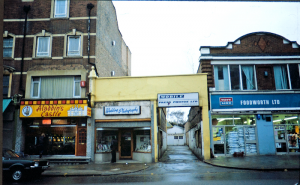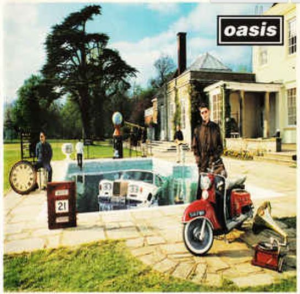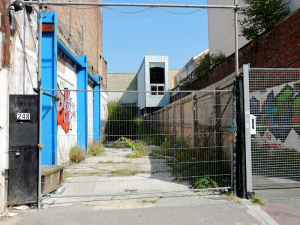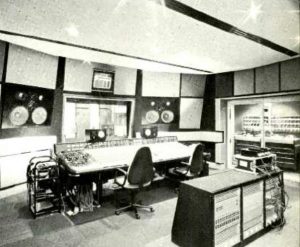Master Rock Studios and the Biograph Cinema, by Dick Weindling
Many buildings in Kilburn have interesting stories, but few can match No.248 Kilburn High Road. The site is now demolished and permission has been given for two blocks of flats. They may not be aware, but the new residents will be living on top of a slice of media history.
The Biograph Cinema
In October 1908, American-born George Washington Grant and two partners formed the Biograph Theatre Company. They saw cinema as the growing medium and opened two Biograph cinemas in the Holloway Road and Peckham in 1909. The busy working-class area of Kilburn was a good place for their next venture. In May 1910, The Biograph Theatre with 600 seats opened at No.236 Kilburn High Road. The trade newspaper, Era, said, ‘It is doing remarkably well and is prettily decorated in brown and gold and is very cosy.’
By then the group had a chain of nine small cinemas in London. Unusually, the manager of the Kilburn branch was a woman, Mrs McCullah. However, the cinema had a short life and closed in 1917, unable to compete with the nearby Oswald Stoll-owned Grange Cinema. This had opened at the end of July 1914 with more than 2,000 seats, making it the largest purpose-built cinema in England. It was only superseded in December 1937 when the iconic Gaumont State opened across the High Road with more than 4,000 seats. Biograph found it difficult to keep its chain profitable, and in 1922 the partners voted to voluntarily wind up the company.
The researchers of early cinema believed that the Biograph was situated behind today’s Speedy Noodle restaurant at No.236 Kilburn High Road, on the corner of Grangeway. However, Grangeway was built after 1914. After the Biograph closed, 236 is not shown in the street directories until 1921 when Gerrard Costumiers opened there. The costumiers appeared again the following year, but in 1923 it seemed to have moved to 248 Kilburn High Road. In fact, it hadn’t moved at all: this section of the High Road had been renumbered.
The correct position of the original Biograph cinema is opposite Buckley Road, (near today’s Tricycle/Kiln Cinema). Access was from the present day No.248, with the cinema building reaching back behind the narrow shop front, almost as far as Grange Park.
From 1926, the cinema building was for many years a billiard hall run by W. Jelks and Sons. They made billiard tables in their Holloway Road factory and ran halls around London. The numbering of the building changed several times and was shown at various times as Nos.246, 246a and 248.
Sadly, no photos of the old cinema seem to exist and all we have of this section of the High Road is one taken in 1979 by Jean Smith. This shows Mobile Press Photos who were at No.248 from about 1951 to the early 1980s. The long wall of the building behind the shop originally housed the old cinema.
 Mobile Press Photos at No.248 Kilburn High Road (Jean Smith, 1979)
Mobile Press Photos at No.248 Kilburn High Road (Jean Smith, 1979)
Master Rock Studios
In January 1986, Steve Flood and Stuart Colman opened Master Rock Studios which they had built at No.248 in the old cinema building. Flood had been looking for three years and had seen 300 buildings before he decided this large open building would make a suitable site. Flood and Coleman asked the top recording studio designer Ken Shearer to plan the building with a large control room and a separate large recording room. The room gained a reputation for the bright sound and was particularly good for drums. They even used the old gents toilet as an echo chamber!
Stuart Colman was a musician who played bass in several bands before becoming a radio presenter on BBC, Radio London and Capital Gold. He produced many hits for Shakin’ Stevens including the 1981 No.1 ‘Green Door’. He also produced records for Billy Fury, The Shadows, Kim Wilde, and Alvin Stardust. Coleman died in April 2018.
The first record to be produced at Master Studios on 29 January 1986 was ‘Living Doll’ by Cliff Richard and The Young Ones for Comic Relief. Steve Flood said they even had to deal with a 40-person film crew.
An amazing number of musicians recorded, or had their albums mastered in Kilburn including Elton John, Jeff Beck, U2, Eric Clapton, Roxy Music, Simply Red, Oasis, Robbie Williams and Suede.
 Oasis, ‘Be Here Now’ (1979)
Oasis, ‘Be Here Now’ (1979)
Flood and Coleman wanted the very best quality mixing and recording equipment so they bought a Focusrite mixing console. Focusrite was founded in 1985 with the aim of producing the highest-quality recording console available at the time, regardless of cost. The prohibitively expensive design, however, limited production to just a few units. One console was delivered to Master Rock Studios in Kilburn and another to the Electric Lady Studio in New York where Jimi Hendrix recorded. For a short introduction to a larger documentary see:
https://www.youtube.com/watch?v=o71f5g04TnE
Bernard Butler, the guitarist with Suede, who recorded ‘Dog Man Star’ there in 1994 said; Master Rock Studios was originally haunted by buying one of the only custom-made Focusrite consoles. It arrived several months late so left them without business for a long time and despite being used on everything after it arrived, I don’t think they recovered.
Despite being busy, the studio had financial problems and in 1991 the business was put up for sale, eventually closing in March 2000.
 248 High Road (Dick Weindling, September 2013)
248 High Road (Dick Weindling, September 2013)
For a list of the records made at Master Rock Studios see:
https://www.discogs.com/label/266266-Master-Rock-Studios

Focusright Console at Master Rock Studios
